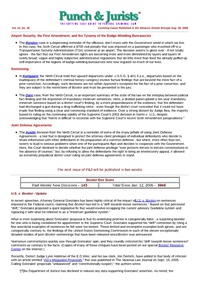Laron Kortgaard was convicted of manufacturing 50 or more marijuana plants, in violation of 21 U.S.C. §§ 841(a)(1) and (b)(1)(C). Based on his criminal history, Kortgaard’s Guideline sentencing range was 21 to 27 months in prison. However, the district court (Judge Kay of the D.Hawaii) concluded that Kortgaard’s applicable …
The Second Circuit held that the "protective sweep" exception to the warrant requirement, recognized in Maryland v. Buie, 494 U.S. 325 (1990), does not automatically allow the police to ramble through a suspect's home to look for 3rd parties whenever the police are present in the home; rather, such …
In petitioner detainee's habeas corpus action challenging his continued detention at the United States Naval Base in Guantanamo Bay, Cuba, the detainee moved for a preliminary injunction barring respondent government from subjecting him to torture or interrogation and a preliminary injunction ordering the government to provide his counsel and …
Here the Second Circuit held that the crime of attempted reentry into the United States following deportation, in violation of 8 U.S.C. § 1326(a), is not a specific intent offense, and thus that the Government need not charge or prove that the defendant knew that his conduct was unlawful, …
The issue in this case was whether the defendant's effort to obstruct the state's investigation of his crime, which preceded the federal investigation and prosecution of a different but related crime, triggered the obstruction enhancement of U.S.S.G. § 3C1.1 for purposes of the federal sentence. The governing language from …
Here, the Eleventh Circuit affirmed amoney laundering convictions against a lawyer, Juan Carlos Elso, who was charged with laundering the drug proceeds of one of his clients. Elso went to his client’s home to pick up cash and he was apprehended driving away with the cash. Elso was charged …
In a decision that discusses at length the permissible scope of Allen charges, the Tenth Circuit held that it was impermissibly coercive, and a violation of the defendant’s due process and Sixth Amendment rights to an impartial jury trial and a unanimous verdict, for the trial judge to give …
Shortly after being indicted in this RICO case, the defendants entered into a court-approved, written Joint Defense Agreement (JDA) allowing them to conduct joint defense meetings and share information on a confidential basis. Subsequently, one of the defendants agreed to cooperate with the Government and he withdrew from the …
In Harris v. U.S., 536 U.S. 545 (2002), the Supreme Court affirmed a mandatory minimum seven year sentence based on the district court’s finding by a preponderance of the evidence that Harris had brandished a gun. In his concurring opinion, Justice Breyer observed that one cannot easily distinguish the …
The Court affirmed a $700 civil penalty that was imposed, pursuant to 49 C.F.R. § 1540.109, on a passenger who mouthed off to a Transportation Security Administration screener at an airport, rejecting claims that the regulation was overbroad and vague.
On July 27, 2002, when Mark Rendon arrived …
The government argued that, while the absence of a conviction involving the crack form of cocaine base might have been significant under the Sentencing Guidelines, that deficiency should not have affected application of the statutory minimum mandatory sentence pursuant to 21 U.S.C.S. § 841(b)(1)(B)(iii) for a crime involving five …
